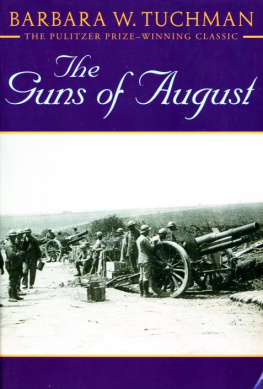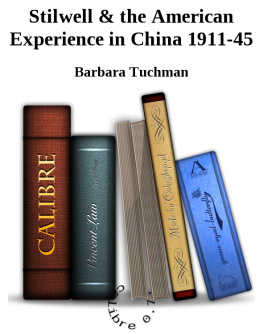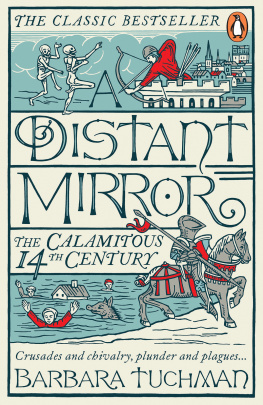Barbara W. Tuchman - Practicing History: Selected Essays
Here you can read online Barbara W. Tuchman - Practicing History: Selected Essays full text of the book (entire story) in english for free. Download pdf and epub, get meaning, cover and reviews about this ebook. year: 2011, publisher: Ballantine Books, genre: Art. Description of the work, (preface) as well as reviews are available. Best literature library LitArk.com created for fans of good reading and offers a wide selection of genres:
Romance novel
Science fiction
Adventure
Detective
Science
History
Home and family
Prose
Art
Politics
Computer
Non-fiction
Religion
Business
Children
Humor
Choose a favorite category and find really read worthwhile books. Enjoy immersion in the world of imagination, feel the emotions of the characters or learn something new for yourself, make an fascinating discovery.

- Book:Practicing History: Selected Essays
- Author:
- Publisher:Ballantine Books
- Genre:
- Year:2011
- Rating:3 / 5
- Favourites:Add to favourites
- Your mark:
- 60
- 1
- 2
- 3
- 4
- 5
Practicing History: Selected Essays: summary, description and annotation
We offer to read an annotation, description, summary or preface (depends on what the author of the book "Practicing History: Selected Essays" wrote himself). If you haven't found the necessary information about the book — write in the comments, we will try to find it.
Barbara W. Tuchman: author's other books
Who wrote Practicing History: Selected Essays? Find out the surname, the name of the author of the book and a list of all author's works by series.
Practicing History: Selected Essays — read online for free the complete book (whole text) full work
Below is the text of the book, divided by pages. System saving the place of the last page read, allows you to conveniently read the book "Practicing History: Selected Essays" online for free, without having to search again every time where you left off. Put a bookmark, and you can go to the page where you finished reading at any time.
Font size:
Interval:
Bookmark:
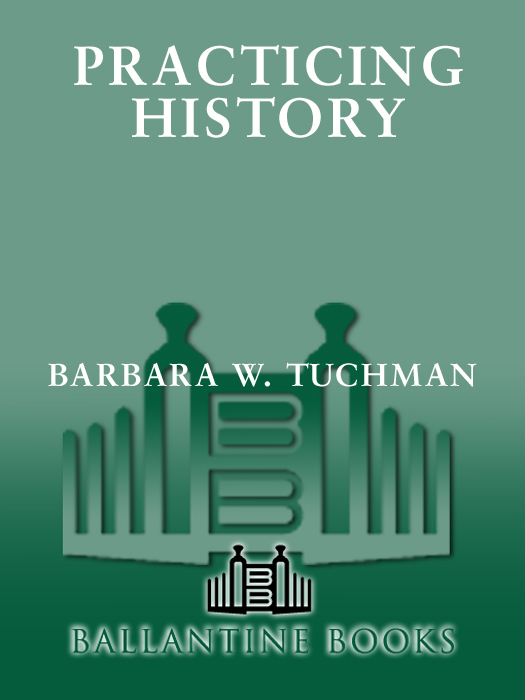
By Barbara W. Tuchman
BIBLE AND SWORD (1956)
THE ZIMMERMANN TELEGRAM (1958)
THE GUNS OF AUGUST (1962)
THE PROUD TOWER (1966)
STILWELL AND THE AMERICAN EXPERIENCE IN CHINA (1971)
NOTES FROM CHINA (1972)
A DISTANT MIRROR (1978)
PRACTICING HISTORY (1981)
THE MARCH OF FOLLY (1984)
THE FIRST SALUTE (1988)
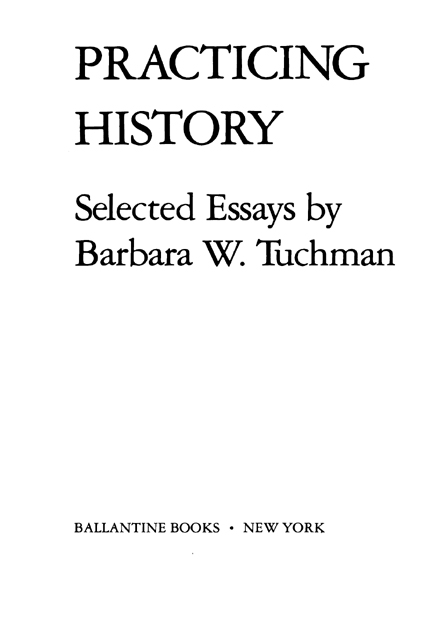
A Ballantine Book
Published by The Random House Publishing Group
Copyright 1935, 1937, 1959, 1962, 1964, 1965, 1966, 1967, 1968, 1971, 1972, 1973, 1974, 1976, 1977, 1979, 1980, 1981 by Alma Tuchman, Lucy T. Eisenberg, and Jessica Tuchman Matthews.
Introduction copyright 1981 by Barbara Tuchman.
All rights reserved.
Published in the United States by Ballantine Books, an imprint of The Random House Publishing Group, a division of Random House, Inc., New York, and simultaneously in Canada by Random House of Canada Limited, Toronto, Canada.
Ballantine and colophon are registered trademarks of Random House, Inc.
www.ballantinebooks.com
All but two of the essays in this book have been previously published.
Library of Congress Cataloging in Publication Data
Tuchman, Barbara Wertheim. Practicing history.
1. HistoriographyAddresses, essays,
lectures. 2. History, Modern20th century
Addresses, essays, lectures. I. Title.
D13.T83 1982 907.2 828757
eISBN: 978-0-307-79855-8
This edition published by arrangement with Alfred A. Knopf, Inc.
v3.1
I t is surprising to find, on reviewing ones past work, which are the pieces that seem to stand up and which are those that have wilted. The only rule I can discover as a determinantand it is a rule riddled with exceptionsis that, on the whole, articles or reports which have a hard, that is to say factual, subject matter or a personally observed story to tell are more readable today than think pieces intended as satire or advocacy, or written from the political passions of the moment. These tend to sound embarrassing after the passage of time, and have not, with one or two exceptions been revived.
Exceptions pursued every principle of inclusion or exclusion I tried to formulate. Two eyewitness accounts of historic episodes which I would have thought would read well in this collection failed, on rereading, to have the quality worthy of revival. One was an account of President Kennedys funeral, written for the St. Louis Post-Dispatch, and the other an account of the reuniting of Jerusalem in June 1967 after the Six-Day War, written for the Washington Post. In the first case, presumably because of the opening paragraphs on the funeral of Edward VII in The Guns of August, I was asked to cover the Kennedy ceremony, and accepted more out of curiosity than commitment. Equipped with press card, I observed the lying-in-state in the Capitol rotunda, circulated among the crowds in Lafayette Square next morning, watched the rather haphazard procession of the visiting heads of state, with De Gaulle towering over the rest, attended the services at Arlington, and retired afterward to a hotel room to turn out my commentary by midnight for next mornings paper. But what could one write when the entire country had been watching every moment of the proceedings on TV for the last thirty-six hours? One could not simply describe what everyone had already seen; one had to offer some extra significance. For me it was too soon: I did not share the mystique of Camelot; I had no sense at that moment of Kennedys place or significance in history, if any, and besides I was unnerved by the midnight deadline. My piece, which took a rather cool view, was a disappointment to readers who wanted the grand tone.
On the occasion in Jerusalem, when against all advice Mayor Kollek ordered the barbed wire and no-mans-land barriers removed, I was present and accompanied an Israeli family on a visit to Arab friends whom they had not seen in nineteen years, and watched Arab street vendors with their goats warily enter the New City, gaping at the sights and already choosing street corners where they could sell soft drinks and pencils. It was a day of tension and drama and immense interest, yet the report I wrote, like the Kennedy piece, lacked punch. These two examples, though not here for the reader to judge, illustrate the difficulty of establishing a principle of selection: I shared the emotion of the moment in one case but not in the other, and both results were flat.
Oddly enough, a report on Israel written for the Saturday Evening Post () in the previous year, on my first visit, turned out and still reads well, I think. Perhaps it was the freshness of the experience, perhaps the fact that I was writing for readers who, as I conceived them, probably knew little or nothing about the country and had no emotional tie to it. I wanted to convey the feeling, the facts, and the historical nature and meaning of the new nation all in one article. One does not always achieve ones purpose in a given attempt, but this one, I believe, succeeded. Subsequently Fodor used it as the Introduction to their Guide to Israel for several years.
Some of the essays in the following pages, like the little Japanese piece at the opening of for the compilation of the IPRs major project of the time, The Economic Handbook of the Pacific. Accordingly, the international secretary of the IPR, William L. Holland, was assigned to the Japanese Council in Tokyo to supervise work on the Handbook, and in October 1934 I followed as his assistant. I remained in Tokyo for a year and, after a months sojourn in Peking, returned home late in 1935 via the Trans-Siberian Railway, Moscow, and Paris.
During the year in Japan I had written a number of pieces for the IPR publications Far Eastern Survey and Pacific Affairs, generally on matters of not very avid public interest like the Russo-Japanese Fisheries controversy. However, on reviewing a book on Japan by a French historian, I was thrilled to receive from the author a letter addressed Chre consoeur (the feminine of confrre, or as we would say, colleague). I felt admitted into an international circle of professionals. This, and the $40 paid for my first piece in Pacific Affairs, with which I bought a gramophone and a record of Un bel di from Madame Butterfly, made me feel I had begun a career.
On returning to America, I tried to express something of what I had learned and thought about the Japanese in the little piece reprinted here. I do not remember when or how it was submitted to so august a journal as Foreign Affairs, but suddenly there I was in print, a novice of twenty-four, among the foreign ministers and opinion-makers and, more important, making the acquaintance of a wise and fine man, the editor, Hamilton Fish Armstrong.
Meantime, in 1936, I went to work for the Nation, which my father, Maurice Wertheim, a banker of rather eclectic interests, had bought from Oswald Garrison Villard to save it from bankruptcy. Freda Kirchwey, Villards successor as editor and a friend of my parents, was left in control, along with a new colleague, Max Lerner. My job at first was to clip and file a far-flung variety of newspapers and periodicals, and gradually to write some of the two hundred-word paragraphs on current events which appeared each week on the Nation
Font size:
Interval:
Bookmark:
Similar books «Practicing History: Selected Essays»
Look at similar books to Practicing History: Selected Essays. We have selected literature similar in name and meaning in the hope of providing readers with more options to find new, interesting, not yet read works.
Discussion, reviews of the book Practicing History: Selected Essays and just readers' own opinions. Leave your comments, write what you think about the work, its meaning or the main characters. Specify what exactly you liked and what you didn't like, and why you think so.

